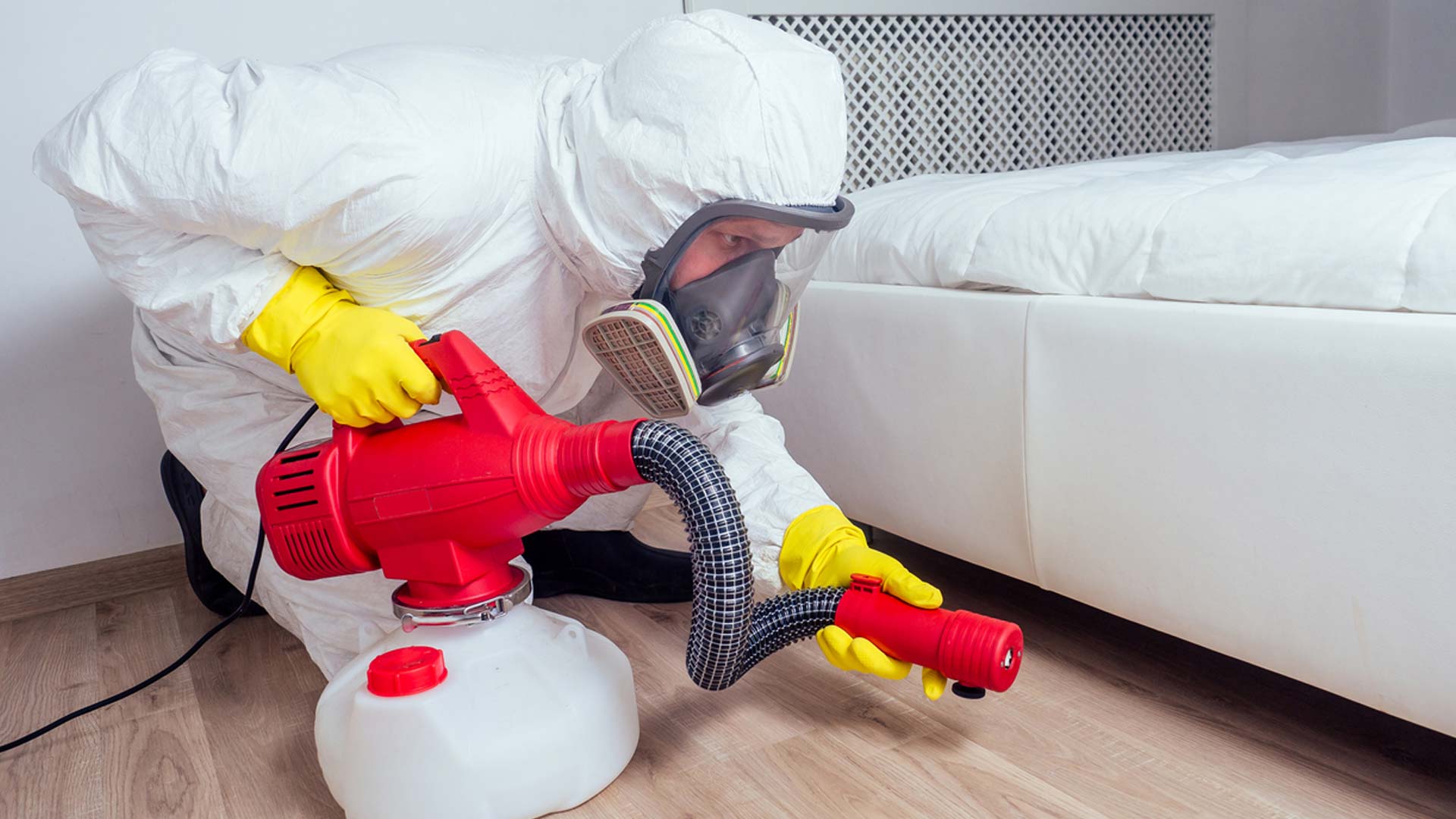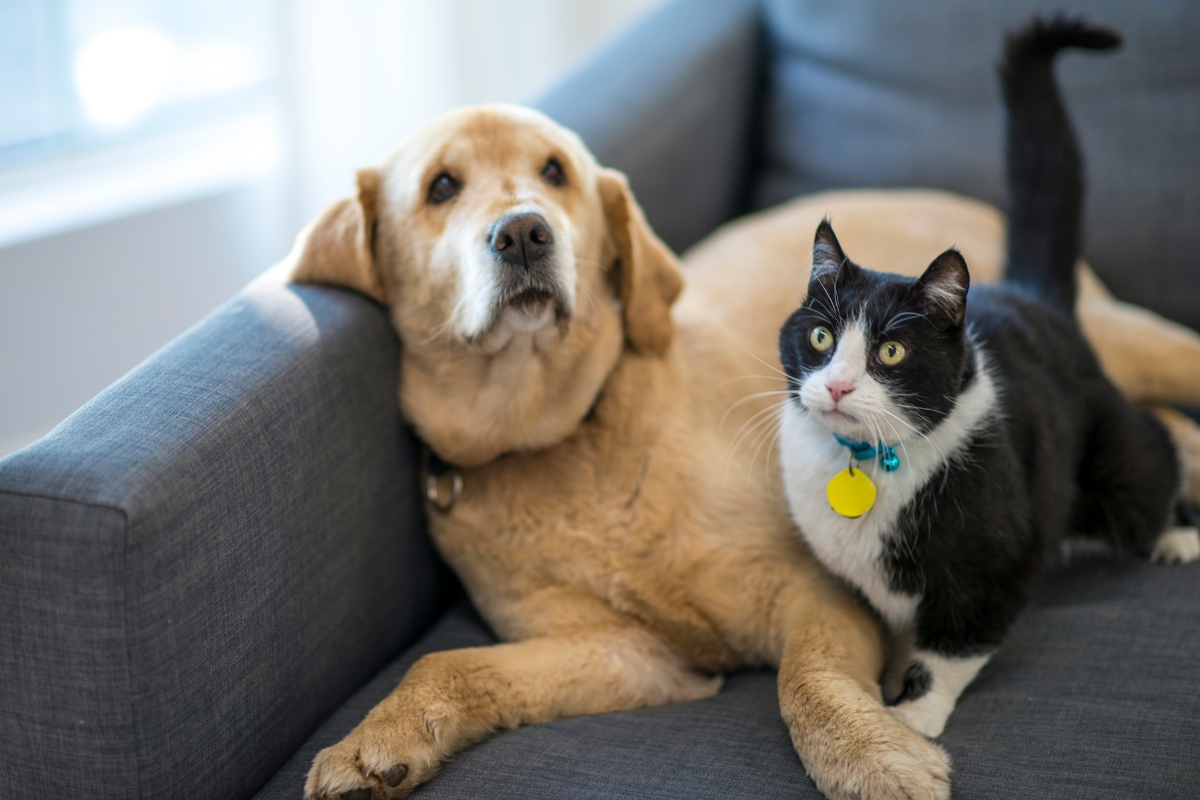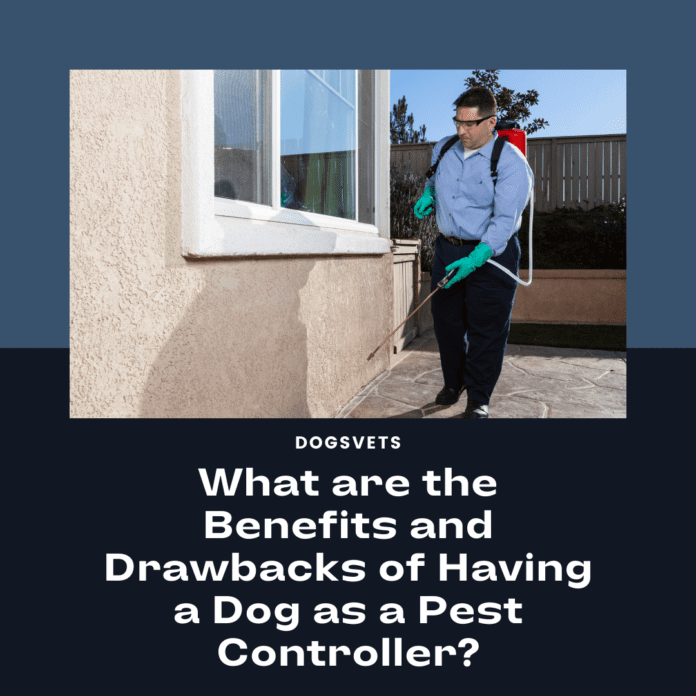Last Updated on April 8, 2024 by Dog Lover
What are the Benefits and Drawbacks of Having a Dog as a Pest Controller?
Ever heard a frantic scratching behind your walls or spotted a creepy crawly scuttling across the floor? Pests can be a real nuisance, causing damage to your property and posing health risks.
While chemical solutions and professional exterminators are effective, some pet owners wonder if their furry friend can lend a paw in the pest control department.
But can Fido truly replace a can of bug spray? The answer, like most things in life, isn’t black and white. While dogs possess certain instincts that can be helpful in deterring pests, there are limitations to consider.
Let’s delve deeper into the advantages and disadvantages of using a canine companion for pest control.
Unleashing the Benefits: How Dogs Can Help with Pest Control
Our canine companions aren’t just bundles of love and slobbery kisses; they possess a keen sense of smell and hearing that can be incredibly beneficial in the fight against unwanted guests.
Here’s how:
-
Deterrence: Many pests, like rodents and insects, have a natural aversion to dogs. Their strong scent and territorial barks can act as a deterrent, keeping these critters at bay. Think of your dog as a furry security system with a built-in warning system!
-
Early Warning System: Dogs with their superior hearing can detect pests like rodents scurrying in walls or insects buzzing in attics long before we humans notice. Their alert behavior, like barking or scratching at specific areas, can be a valuable early warning system, allowing you to take action before an infestation takes hold.
-
Pest Patrol: Some dog breeds, particularly terriers and hounds, were originally bred for hunting vermin. These breeds retain strong instincts for tracking and catching pests, making them natural-born pest patrollers.

Beyond Barking Back: Limitations of Canine Pest Control
While dogs offer some undeniable benefits, it’s important to be realistic about their limitations.
Here’s where the dream team approach of dog and professional pest control comes in:
-
Selective Tastes: Not all dogs are created equal when it comes to pest-catching. Some breeds may be more interested in playing with a spider than eliminating it. Additionally, certain pests, like snakes or stinging insects, might pose a threat to your dog, making canine intervention inadvisable.
-
Accidental Accomplices: While some dogs deter pests, others, particularly young puppies or those with high prey drives, might unintentionally assist pests by creating burrows or chasing them further into your house.
-
Incomplete Elimination: Even the most enthusiastic canine hunter is unlikely to completely eradicate a pest infestation. While they may catch a few rodents or insects, a professional exterminator has the tools and expertise to address the root cause of the problem.
The Ideal Dog for Pest Control: What to Consider
If you’re looking for a furry friend who can lend a paw (or a bark) in the pest control department, consider these factors:
-
Breed: Breeds like Jack Russell Terriers, Fox Terriers, and Dachshunds were originally bred for hunting vermin and may have stronger pest-catching instincts.
-
Temperament: Choose a dog with a confident and assertive personality. Shyness or nervousness around potential prey could hinder their effectiveness.
-
Training: Consider obedience training to ensure your dog can differentiate between acceptable and unacceptable behavior when encountering pests.

Working Together: Combining Canine Companions and Professional Pest Control
So, should you ditch the bug spray and rely solely on your dog for pest control? Absolutely not! While dogs can be valuable assets in the fight against pests, professional extermination services offer comprehensive solutions that address the root cause of infestations.
Think of it as a dream team approach: your dog acting as a first line of defense, and a professional exterminator providing in-depth treatment and prevention strategies.
Beyond Bugs: Other Ways Dogs Can Help Around the House
The benefits of canine companionship extend far beyond pest control. Studies have shown that dogs can:
- Reduce stress and anxiety
- Improve heart health
- Boost social interaction
- Provide a sense of security
Creating a Pawsome Pest-Free Home: Essential Tips
Now that we’ve explored the potential of our canine companions in pest control, let’s delve into some practical tips to maximize their effectiveness and create a harmonious human-dog-pest-free home:
-
Maintain a Clean Environment: A clean home with minimal food debris and clutter provides fewer hiding spots and food sources for pests, making your dog’s job (and the exterminator’s) a whole lot easier. Regular vacuuming, sweeping, and proper food storage are key.
-
Seal Entry Points: Even the most determined deterrent can’t stop pests if they have easy access. Inspect your home for cracks, crevices, and gaps around doors, windows, and pipes. Seal these entry points with caulk or weather stripping to discourage unwanted visitors.
-
Supervise Interactions: While some dog breeds excel at pest control, it’s always best to supervise your dog’s interactions with pests, especially those that might pose a threat like stinging insects or snakes. This helps protect both your dog and the pest (if you’d prefer humane removal).
-
Prioritize Professional Help: Remember, dogs are excellent deterrents and early warning systems, but they aren’t a replacement for professional pest control. If you suspect an infestation, don’t hesitate to contact a licensed exterminator who can address the issue efficiently and safely.
-
Positive Reinforcement: When your dog exhibits positive pest-control behavior, like alerting you to a scuttling sound or barking at a rodent, shower them with praise and treats. Positive reinforcement encourages them to continue this desirable behavior.

Beyond the Basics: Advanced Techniques for Canine Pest Control
For those interested in taking their canine pest control a step further, consider these advanced techniques:
-
Scent Training: Professional trainers can teach your dog to identify the scent of specific pests, like bed bugs or termites. This can be a valuable tool for early detection and prevention.
-
Vermin-Specific Training: Some specialty training programs focus on specific pests like rodents or moles. These programs teach dogs to locate burrows and alert their handlers.
Important Considerations: Safety and Wellbeing
While dogs can be valuable assets in pest control, their safety and wellbeing are paramount. Here are some important considerations:
-
Vaccinations: Ensure your dog is up to date on all their vaccinations to protect them from potential diseases carried by pests.
-
Parasite Prevention: Regular flea and tick prevention is essential, especially if your dog frequently encounters pests in the yard.
-
Avoiding Harmful Chemicals: If you choose to use chemical pest control products, consult your veterinarian first and follow all safety instructions carefully to protect your dog from exposure.

The Final Verdict: Can Dogs Be Effective Pest Controllers?
The answer is a resounding “maybe.” Dogs can be valuable deterrents and early warning systems against pests. However, their effectiveness depends on breed, temperament, training, and the specific pest in question.
For comprehensive pest control,a professional exterminator is still irreplaceable. Think of it as a layered approach: your dog as a vigilant watchguard and a professional exterminator providing in-depth treatment and prevention plans.
Living with a Pest-Controlling Pup: FAQs
Here are some frequently asked questions regarding dogs and pest control:
What are the best dog breeds for pest control?
Breeds like Jack Russell Terriers, Fox Terriers, Dachshunds, Beagles, and German Shorthaired Pointers have a history of vermin hunting and may possess stronger pest-deterring instincts.
Can I train my dog to catch pests?
Basic obedience training is essential for any dog, but advanced training programs can teach your dog to identify specific pest scents or locate burrows. Consult with a professional dog trainer to explore these options.
Should I use pesticides if I have a dog?
If necessary, consult your veterinarian first and choose pet-safe products whenever possible. Always follow all safety instructions carefully to protect your furry friend from exposure.
Is a dog a replacement for professional pest control?
Absolutely not! While dogs can be a valuable first line of defense, professional exterminators have the expertise and tools to address the root cause of an infestation and implement long-term prevention strategies.
How can I create a pest-resistant environment for my dog?
Maintain a clean home, seal entry points, and store food properly to deter pests in the first place. Regular vacuuming, sweeping, and trash removal are key. By combining these practices with your dog’s natural deterrent abilities, you can create a more pest-free environment for both of you.
Conclusion
Dogs bring immense joy and companionship to our lives. While their pest-control abilities may be limited, they can certainly play a supportive role in a multi-pronged approach to pest prevention and early detection.
Remember, the key is to understand your dog’s strengths and limitations, prioritize professional help when needed, and create a safe and pest-resistant environment for your furry friend to thrive in.
Verified Source References
- American Kennel Club: https://www.akc.org/dog-breeds/
- Environmental Protection Agency: https://www.epa.gov/safepestcontrol
- National Association of Professional Pest Controllers: https://www.npmapestworld.org/

















